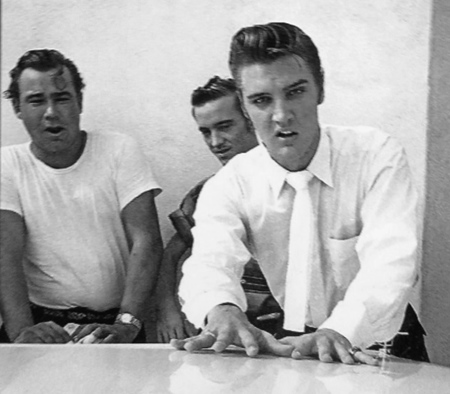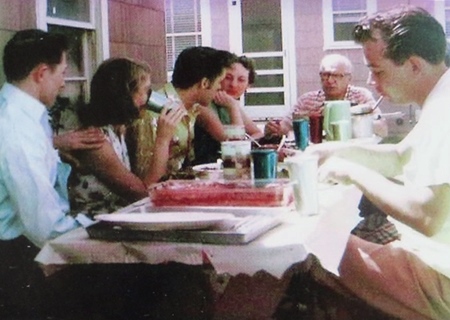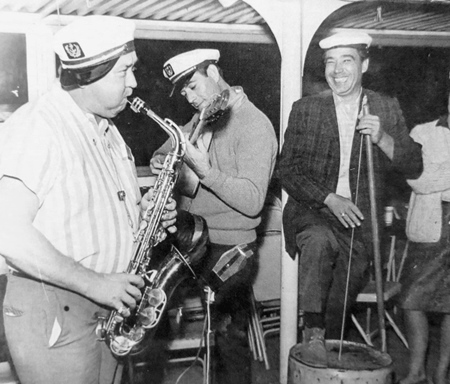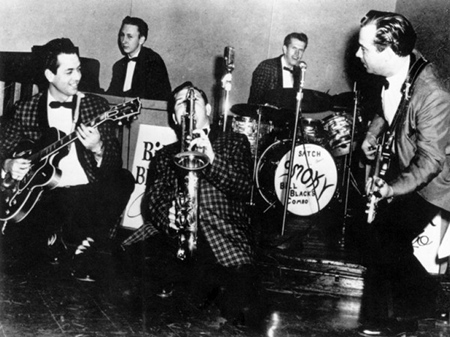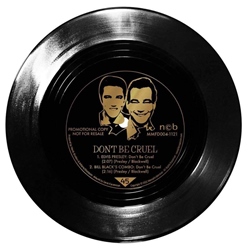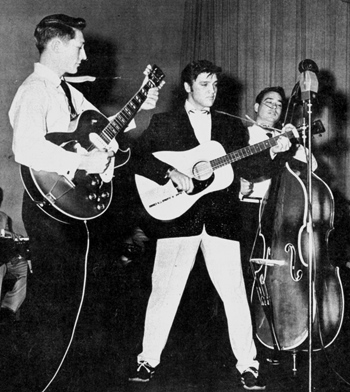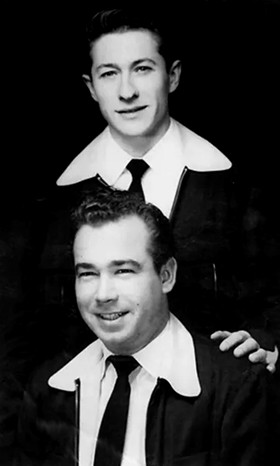 |
 |

Bill Black was one of the key players at the start of the rock 'n' roll explosion yet there has never been a good biography about his personal story and involvement in Elvis's incredible journey – until now. Beautifully matching Scotty Moore's biography ‘That's All Right, Elvis’ at last we have a fascinating exploration of Paul Belard’s ‘Don't Be Cruel, Elvis - The Bill Black Story’. Starting back in 2017 author Paul Belard has published multiple books looking back at Elvis' legacy often examining a specific time period, but never an in depth biography Memphis Mansion’s Henrik Knudsen fortuitously befriended Bill Black's family and was entrusted with the family’s treasured scrapbook. (There’s a delightful photograph of Henrik with Bill Black’s daughter on page 14). Using this key source of photos and newspaper clippings plus the investigative power of author Paul Belard, together with the fine design by Soren Karstensen, Elvis fans finally have a stunning biography of this all-important musician. The book is A4 and 260 pages. Part One – ‘The Elvis Years’ - is 140 pages.
The Starlight Wranglers, with Scotty Moore and Bill Black
Sidenote: I never realised Starlight Wranglers’ lead-singer Doug Poindexter had quit the music business as early as 1954. I love his quote, “There was no way of knowing success was coming to Presley. Frankly, I thought the boy would starve to death” Part Two – ‘The Bill Black Combo’, plus his recording studio and publishing. This includes 45 pages about the second part of his career plus 70 pages of tributes, a look at his legacy, lots of rare photographs plus his vinyl releases. While I knew of the success of the 45rpm single 'Smokie, Part 2' - an R&B number 1 and Billboard #17 - it is a surprise to learn just how successful his Bill Black Combo instrumental Albums were at the time and interesting to see other future players from Elvis' legacy featuring in The Bill Black Combo such as Reggie Young, Bobby Emmons and Chips Moman. It's all too easy to forget the importance of Bill Black in the early Elvis sound, such as the essential back-beat he supplied before the arrival of D.J. Fontana and his astounding double-bass that anchors ‘Heartbreak Hotel’. Regarding ‘That's All Right’ Belard neatly explains…
It is also essential to realise that the all-important flip-side ‘Blue Moon of Kentucky’ might not have happened without Bill Black’s input..
Elvis with Bill Black rockin' out together - April 5, 1955
It is unfortunate that Elvis fans have never had a chance to truly hear Bill Black's version of events through a long, in-depth interview or autobiography but Paul Belard has tracked down some very interesting band interviews - along with post-Elvis newspaper articles - which do provide a good look at Bill Black's side of the story. This includes a lengthy Memphis Press-Scimitar interview from December 1956. It includes..
The early part of the book also explains how Blackie’s joking antics on-stage often saved an Elvis performance from a difficult crowd.
Elvis and his new car - Tampa, Florida, August 5 1956
The book also includes plenty of reminiscences from Bill Black’s colleagues, including a delightful interview with his brother.
A fabulous photo of Elvis, Scotty Moore and Bill Black having lunch with 'Pop'
Holifield, April 1955. The Holifield's owned record stores and also booked concerts by artists such as Johnny Cash and Elvis.
Other highlights are discovering new stories including… 1. Bill Black adding his pounding beat to Johnny Horton recording sessions Sidenote: From the Sept 9 1956 Ed Sullivan Show Elvis was paid $6029, Col Parker took $4166 while Scotty Moore and Bill Black only got paid $165 each! Other joys include a unique foreward by bassist Suzi Quatro “we are the engine that drive the car”- tributes to “Blackie” from other bass players and plenty of comments from Scotty Moore.
'Blackie' with Joe Coughi, owner of Poplar Tunes record store and 'Hi Records' studio.
The story of how Parker successively forced both Scotty and Bill Black to quit the band is particularly disturbing, and the fact that Elvis did not stand up for his friends is also rather sad. The private letter from Bill Black to Tom Diskin says it all…
Very sadly Bill Black died of a brain tumour in October 1965, he was only 39 years old. Bill's death obviously hit Elvis very hard and the book includes this positive note - 'Bill's children acknowledged Elvis was always kind to them. His son Louis would frequently visit Graceland. Elvis would chat with him, tell him about his father, Bill. According to Louis Black, Elvis said, "If there's, anything that y'all need, you just let me know and it's yours.” The number of photographs and relevant memorabilia in the book is extremely impressive and the design very stylish- with each chapter introduced by an old-fashioned ‘silver gelatin’ styled image. One of the real joys I found about the book was seeing all the later photographs of ‘Blackie’ playing with his combo or standing with friends and seeing that cheeky smile on his face.
'Blackie' with John 'Ace' Cannon and Hank Hankins
A 1961 article about Bill Black notes..
The Bill Black Combo - with 'Ace' Cannon, Hank Hawkins and a very young Bobby Emmons (later included on Chips Moman's Elvis Memphis Sessions) playing keyboards
.
Overall Verdict: Packed full of rare photos and new stories to add to the Elvis' legacy, this is a truly fascinating book. Author Paul Belard has tracked down so many interviews and news articles, with it all combining to make an enthralling look into the life of bass-man Bill Black. The research is impressive, as are all the delightful stories about this great musician. The commentary on Bill Black's importance and style of his bass playing even made me go back to re-visit some Elvis fifties classics once again, helping me discover something new. And if that isn't a great recommendation for an Elvis book, then what is? Click here to comment on this Review
EIN Website content © Copyright the Elvis Information Network.
Elvis Presley, Elvis and Graceland are trademarks of Elvis Presley Enterprises. The Elvis Information Network has been running since 1986 and is an EPE officially recognised Elvis fan club.
|
|




